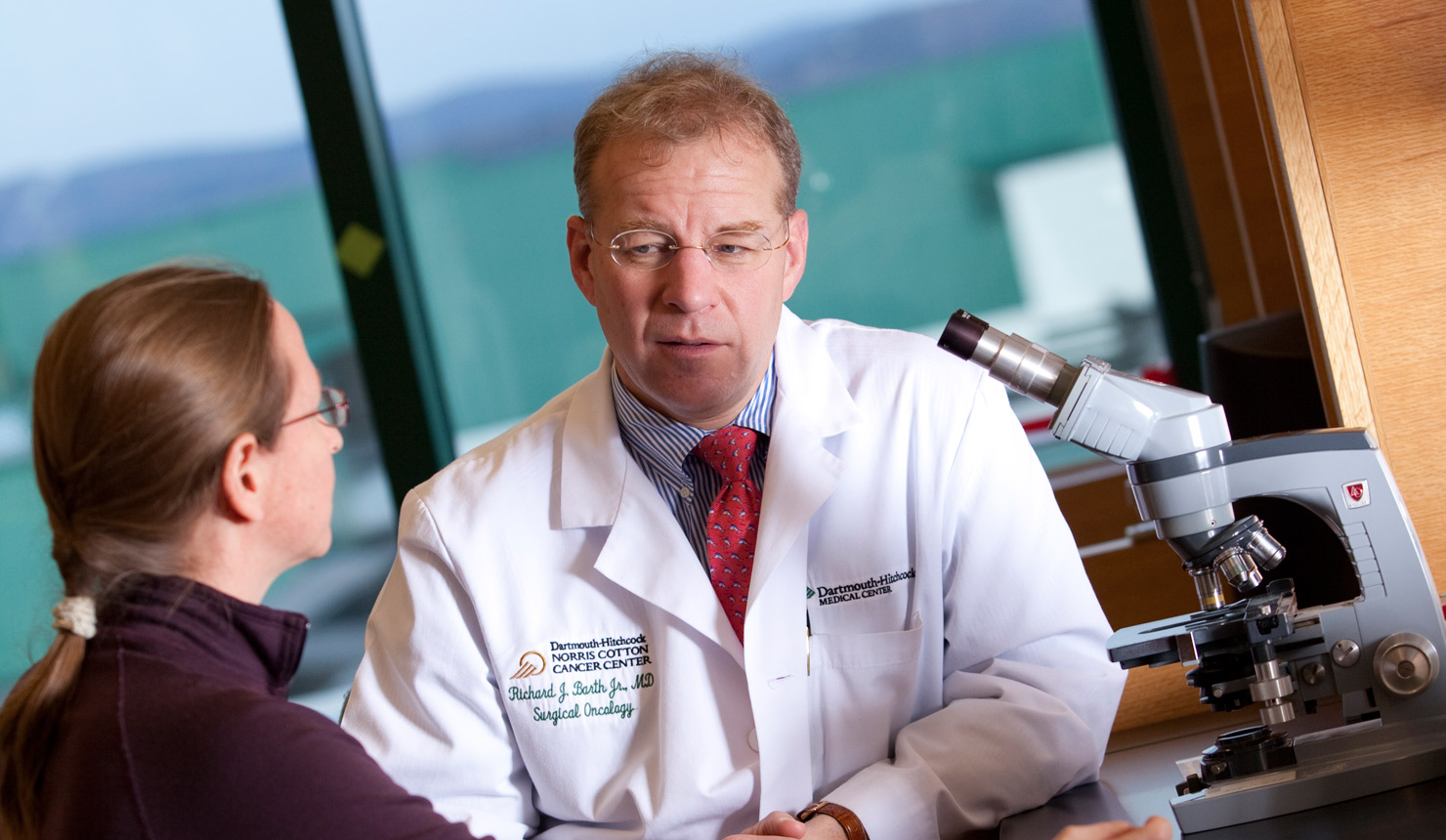The world opened up to Quyen Chu DC’90, M’94, when he was accepted to Dartmouth College and later to medical school. Now a successful surgeon, he gives back to help others, including those half a world away.
Articles by: Geisel Communications
American Cancer Society Says Women Should Start Mammograms at 45
USA Today – Quotes Lisa Schwartz, professor of medicine, community and family medicine, and of the Dartmouth Institute for Health Policy and Clinical Practice, about how the American Cancer Society is recommending fewer mammograms. The American Cancer Society updated their guidelines on Tuesday to state that women at average risk of breast cancer should begin annual mammograms at age 45. Schwartz noted that most women overestimate how much mammograms actually help, and that mammograms reduce the risk of dying from breast cancer by as little as 15% to as much as 40%, depending on which studies people consider.
Doctors Eye Opioid Restrictions
New Hampshire Union Leader – Article quotes Seddon Savage, adjunct associate professor of anesthesiology and director of the Dartmouth Center on Addiction, Recovery and Education, in an article discussing how two physician groups—and a task force associated with New Hampshire Gov. Maggie Hassan’s own commission reviewing the state’s opioid crisis—have written letters to the Board of Medicine to rush rules into effect that restrict the ability of doctors to write opioid prescriptions. Savage encouraged the Board of Medicine to take the traditional rulemaking route, which involves public hearings, public input and review by a legislative committee. “Based on our evolving review, it is clear that various mandated policies related to opioid prescribing can have significant impact on patient care that may be positive, but that can result in significant unintended negative consequences as well,” says Savage.
Barth Appointed to Dartmouth SYNERGY Clinician-Entrepreneur Fellowship
Dartmouth SYNERGY Clinical and Translational Science Institute has appointed Richard J. Barth, Jr., MD, as the first recipient of its SYNERGY Clinician-Entrepreneur Fellowship (S-CEF). The S-CEF will provide Dr. Barth with resources and dedicated time to develop and study the commercial potential of a new system to improve certain types of breast cancer surgery.
CardioBrief: Indiana Cardiologist Accused of Unnecessary Procedures
Med Page Today – Coverage of a study conducted by researchers at the Dartmouth Institute for Health Policy and Clinical Practice, related to a lawsuit that 293 patients are filing against three doctors at a cardiology practice in Munster, Ind., claiming that the doctors performed needless procedures. The study showed that Munster had some of Indiana’s highest rates per capita for cardiac catheterizations and coronary angioplasties, procedures that, in many cases, can be elective. When investigators studied rates per capita for procedures that must be treated—a hip fracture, for instance—Munster was below average in the state.
Debate Over Early-Stage Cancer: To Treat or Not to Treat?
The Wall Street Journal – Quotes H. Gilbert Welch, professor of medicine, community and family medicine, and of the Dartmouth Institute for Health Policy and Clinical Practice, in an article about how more researchers are suggesting “active surveillance” for certain patients instead of surgery, and whether Americans are being over-treated for early-stage malignancies or precancerous lesions that could possibly have been left alone with little risk of negative effects. “We go too far and end up creating more problems than we solve,” when medicine treats small harmless lesions, says Welch
Silver Lining of Old Age: Ditching the Screenings
Naples Daily News – Quotes Steven Woloshin and Lisa Schwartz, both professors of medicine, community and family medicine, and of the Dartmouth Institute for Health Policy and Clinical Practice, on a recent announcement from the U.S. Preventive Services Task Force that average-risk people can stop getting mammograms for breast cancer and colonoscopies for colon cancer around 75. And, after 65, most women can forget about Pap tests for cervical cancer. “So you don’t have to worry so much about (cancer) screening because you’re more likely to die of something else,” says Woloshin. “That’s a hard conversation for doctors and patients to have.”
When Should Women Start Getting Mammograms, and Why Is It So Controversial to Ask?
Jezebel – Cites research conducted by H. Gilbert Welch, professor of medicine, community and family medicine, and of the Dartmouth Institute for Health Policy and Clinical Practice, published in a 2010 New England Journal of Medicine article, on the merits of screening mammographies.
7 Things That Happen When You Stop Eating Dairy
Rodale’s Organic Life – Cites a study conducted by researchers at the Geisel School of Medicine, which found that milk contains testosterone-like hormones that may stimulate oil glands in the skin and contribute to breakouts, in an article that discusses what you stand to gain—or lose—when removing dairy from your diet.
Cogswell Conference to Focus on Substance Abuse
Seacoastonline.com – Mark McGovern, professor of psychiatry, will serve as keynote speaker at this year’s Erik Cogswell Memorial Conference to raise awareness about mental illness and provide people from diverse backgrounds with current resources and information. McGovern comments on the disparity in how treatment and recovery services are designed and delivered.

